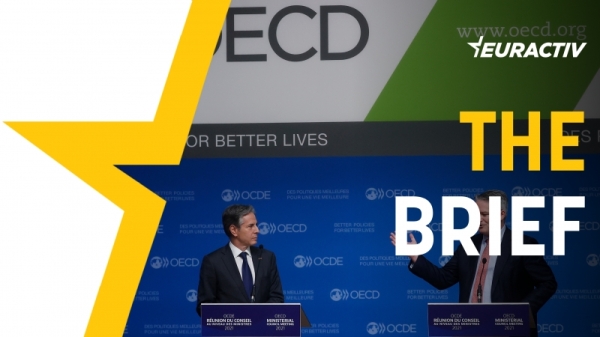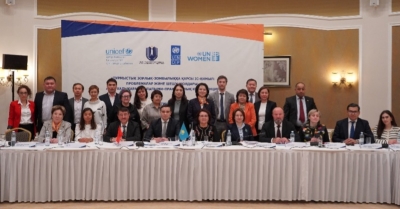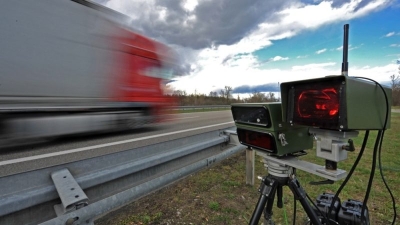The Brief — Whose aid is it anyway?

There was surprise earlier this year when the Swedish Migration Minister Maria Malmer Stenergard – whose government holds the six-month rotating presidency of the EU Council – told reporters that trade access and aid could be denied to countries who refuse to cooperate on migrant returns.
Explicitly linking these to migration control had previously been taboo. Over the last few months, however, it has gradually become standard EU policy.
The answer to why lies partly in a series of reforms made quietly last December by members of the Development Assistance Committee at the Organisation for Economic Co-operation and Development (OECD).
The DAC and its work is something of a niche subject. A small number of reporters follow the annual publication of the DAC’s development aid figures.
But the changes to the rules on what can be classified as official development aid (ODA), haggled over for several years among the DAC’s 31 member states – 20 of which are EU members – marked a radical shift.
To most people, development aid is about providing support to the world’s poorest. But that mission is slightly at odds with the new rules, under which development cooperation programmes can be part of “a broader policy dialogue with the beneficiary country, including in the field of migration”.
For example, a scheme that makes the developing country “more willing to co-operate in the return and readmission of rejected asylum seekers and irregular migrants” can be classified as ODA.
Elsewhere, while forced migrant returns cannot be classified as ODA, reintegration programmes for forced returnees can be if they primarily focus on developing countries’ economic development and welfare.
The new rules also state that “reintegration activities undertaken in countries of origin are in principle ODA-eligible irrespective of the status of returnees (forced or voluntary)”.
Funding for border walls, craved by several EU countries, is one of the few items that still cannot constitute aid, at least for now.
The result of these changes is that, in 2022, EU countries were the main recipients of their own aid.
In 1970, wealthy countries in the UN general assembly set themselves a target of spending 0.7% of their national income on development aid.
They have never met the target.
Indeed, only six EU countries, 20 of which are DAC members, have hit it. Germany, for example, the EU’s largest donor country, met the 0.7% in 2022 purely because of its spending on supporting Ukrainian refugees.
In the meantime, broadening the rules to allow in-country refugee spending, a variety of loans, defence spending, and border control to be counted as aid is denuding the 0.7% target of its original meaning.
It is a fact of life that governments of all political colours will bend figures to allow them to meet spending targets. However, if the 0.7% target is going to allow spending that is emphatically not aid-related then there is little point in keeping it.
The Roundup
Ukraine’s armed forces, gearing up to retake the eastern city of Bakhmut this spring, have altogether lost fewer than 15,000 troops since the Russian invasion began last February, according to excerpts of an internal EU memo seen by EURACTIV.
The ‘crusade’ against the agricultural elements of the Green Deal by the centre-right European People’s Party (EPP) risks upsetting the balance of the established pro-European majority, according to leading liberal MEP Pascal Canfin, who urged the Commission President Ursula von der Leyen to step in.
The German parliament has decided to launch a panel of randomly selected citizens set to advise lawmakers on food and nutrition policies, in an effort to help navigate the thorny issue of the state interfering in dietary choices.
Plans for Europe’s largest onshore salmon farm in southwest France, viewed as ‘absurd and disproportionate’ by activists and touted by the company behind the project as a chance to push for EU sovereignty, are now on the radar of the European Commission and Parliament.
With Spain leading shark fishing and the manufacturing of unprocessed shark fins in Europe, Spanish MEPs took distance from their respective political groups and stood against a citizens’ petition calling for a ban on the trade of fins.
Germany’s planned ban on new fossil heaters looks set to be defeated by staunch parliament opposition and could take as long as 2030 to come fully into effect.
Germany wants to take a leading position in the field of quantum technology and catch up with China and the United States, according to a new government strategy presented in the Bundestag on Thursday.
French President Emmanuel Macron called for a “regulatory break” on Thursday to help industry digest the standards of the European Green Deal, a call that has caused quite a stir among observers and EU politicians.
The International Renewable Energy Agency (IRENA) and the United Arab Emirates’ clean energy company Masdar have joined forces to create a path to tripling the world’s renewable energy capacity by 2030, ahead of the UN’s next annual climate conference, COP28.
The European Parliament voted Thursday (11 May) to support new rules to improve product durability by combatting greenwashing and misleading claims on consumer labels, such as ‘CO2 neutral’ or ‘carbon neutral’.
Progress in trilogue negotiations on the political advertising regulation has been slow but the European Commission’s new proposal on targeting based on sensitive data is set to further complicate the picture.
As always on Friday, do not miss this week’s Tech Brief and the Agrifood Brief for a roundup of policy news.
Look out for….
- High Representative Josep Borrell participates in Indo-Pacific Ministerial Forum in Stockholm on Saturday.
- Health Stella Kyriakides attends G7 Health Ministers Meeting in Nagasaki, Japan, on Saturday-Sunday.
- Eurogroup meeting on Monday.



